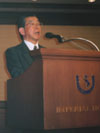In view of what is happening in international affairs surrounding Japan, there seems to be a stronger need than ever for expressing opinions and disseminating information from Japan. However, the flow of information in English from Japan to the outside world is quite stagnant. Given this fact and also in response to rapidly expanding broadband services around the globe, GLOCOM has established the "Japanese Institute of Global Communications" (JIGlocom) to promote opinion exchange and information dissemination in English, and to coordinate similar efforts by other organizations in Japan.
On April 21, a press conference was held to explain more about activities at the new institute, joined by representatives of some other organizations having the same objectives as JIGlocom.
Program:
1. Outline of Activity at JIGlocom
by Takahiro Miyao (Institute Head, JIGlocom)
The purposes of JIGlocom's activity are (1) to provide a platform where Japanese opinion leaders express their views in English on key issues relating to Japan, and (2) to correct misunderstandings and misinformation about Japan as reported oveseas in a timely manner. New activities at JIGlocom include (1) effective communications in the era of multimedia and broadband service, and (2) video series on interviews and seminars. To illustrate our activity in this regard, a sample of recent video interviews (The Best of Video) was shown at the press conference.
Video: Real Player (45k)
Video: Windows Media Player (45k)
2. Role of JIGlocom in Information Society
by Shumpei Kumon (Executive Director, GLOCOM)
Video: Real Player (Japanese / 45k)
Video: Windows Media Player (Japanese / 50K)
 After three years of trial for the GLOCOM Platform to disseminate information from Japan, we have now decided to make this Platform activity an independent organization, called the Japanese Institute of Global Communications (JIGlocom). This independent institute should be able to work more freely and creatively in the information society. In the actual world, we often witness the reality of a "military power game" or an "economic power game," but the final outcome will depends on a "wisdom game," where the "soft" power of information-gathering, processing and dissemination is constantly tested. This is where our new institute can play an important role. It is encouraging to see JIGlocom supported by so many other organizations. JIGlocom should make use of this kind of network as well as new technologies such as mobile/wireless communications to achieve its goal. After three years of trial for the GLOCOM Platform to disseminate information from Japan, we have now decided to make this Platform activity an independent organization, called the Japanese Institute of Global Communications (JIGlocom). This independent institute should be able to work more freely and creatively in the information society. In the actual world, we often witness the reality of a "military power game" or an "economic power game," but the final outcome will depends on a "wisdom game," where the "soft" power of information-gathering, processing and dissemination is constantly tested. This is where our new institute can play an important role. It is encouraging to see JIGlocom supported by so many other organizations. JIGlocom should make use of this kind of network as well as new technologies such as mobile/wireless communications to achieve its goal.
3. Importance of Information Exchange in Current International Relations
by Toyoo Gyohten (President, Institute for International Monetary Affairs)
 In this age of globalization, information is shared by everyone in the world almost instantly, and the value of information is increasing accordingly. Unfortunately, Japan tends to be ignored in the international community these days, although Japan's influence remains to be significant, at least economically. Therefore it is crucial to express our opinions more actively, especially in English, to make a difference. In this regard, the role of JIGlocom will be quite important, and your support would be highly appreciated. In this age of globalization, information is shared by everyone in the world almost instantly, and the value of information is increasing accordingly. Unfortunately, Japan tends to be ignored in the international community these days, although Japan's influence remains to be significant, at least economically. Therefore it is crucial to express our opinions more actively, especially in English, to make a difference. In this regard, the role of JIGlocom will be quite important, and your support would be highly appreciated.
4. Support for Activity at JIGlocom
by representatives of various organizations
Representative of the following organizations participated in the press conference and expressed their willingness to collaborate with JIGlocom:
ESUJ: English Speaking Union of Japan (http://www.esuj.gr.jp/index_eng.htm),
represented by Masamichi Hanabusa
JCIC: Japan Center for Intercultural Communications (http://home.jcic.or.jp),
represented by Makoto Asabuki
RIETI: Research Institute of Economy, Trade and Industry (http://www.rieti.go.jp/en/index.html),
represented by Masahiro Katsuno
NIRA: National Institute for Research Advancement (http://www.nira.go.jp)
IIPS: Institute for International Policy Studies (http://www.iips.org),
represented by Mikiyo Kiyoi
I-ISE: Institute of International Socio-Economic Studies (http://www.i-ise.com/index_e.html),
represented by Izumi Harada
NBR: National Bureau of Asian Research (http://lists.nbr.org/japanforum),
represented by Eric Dinmore
5. Questions and Answers
| 




